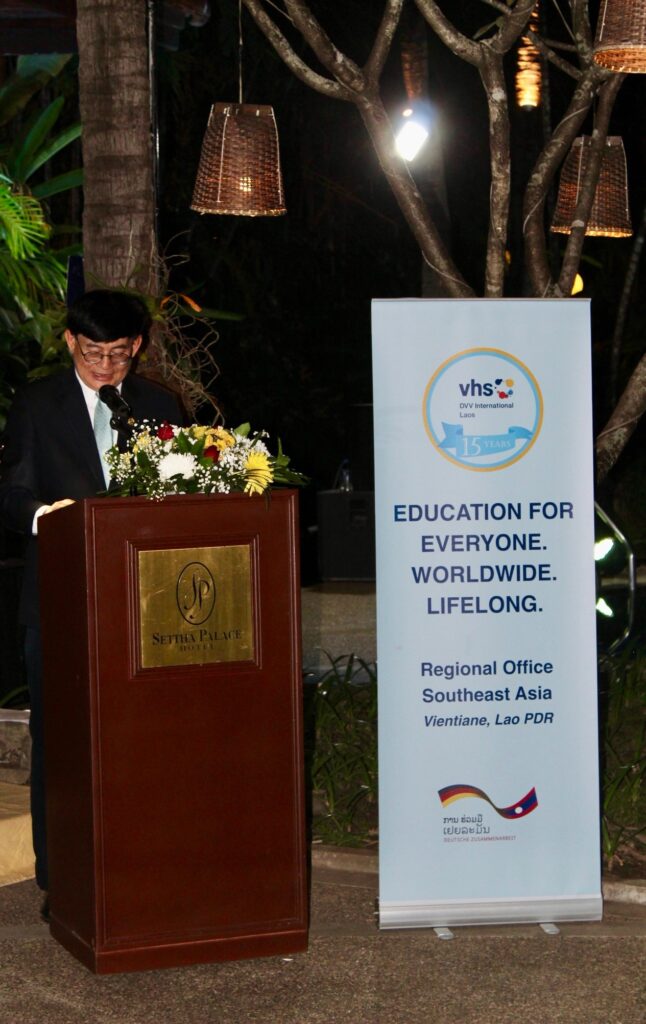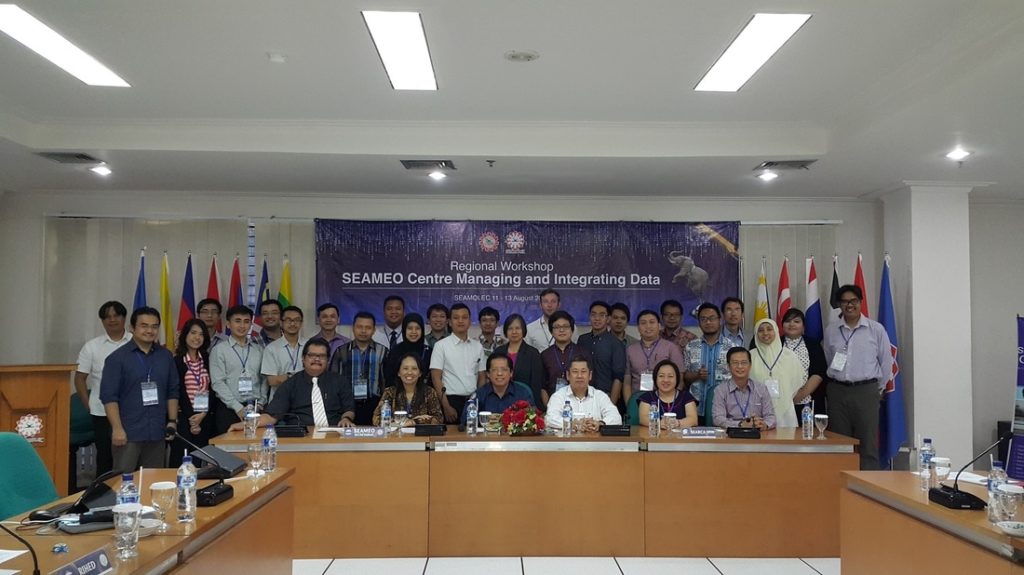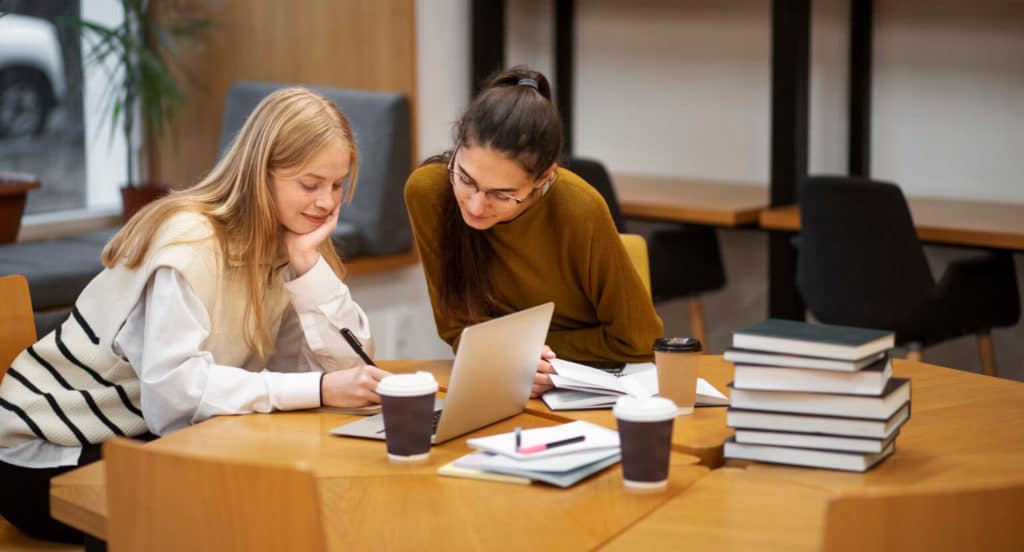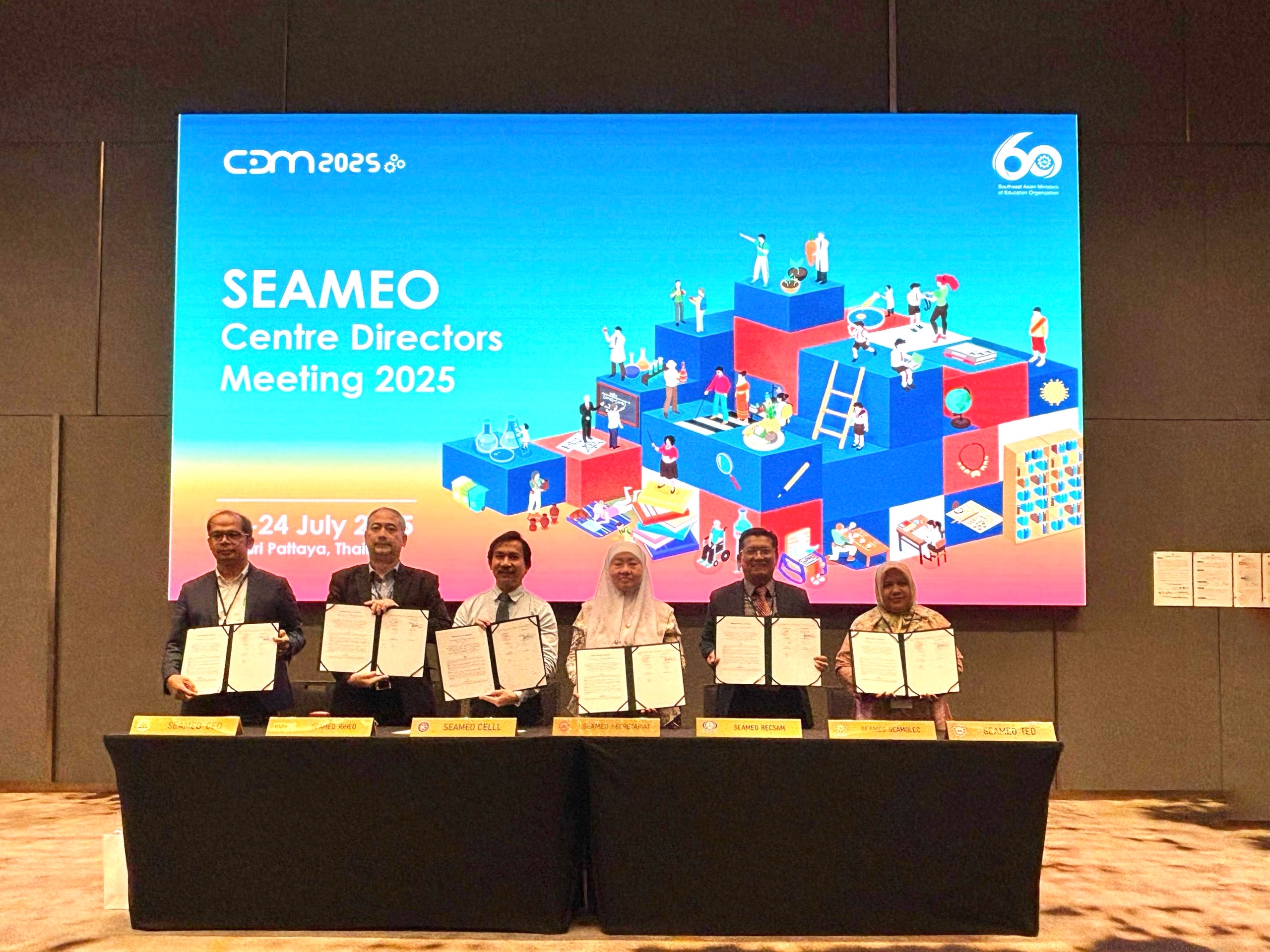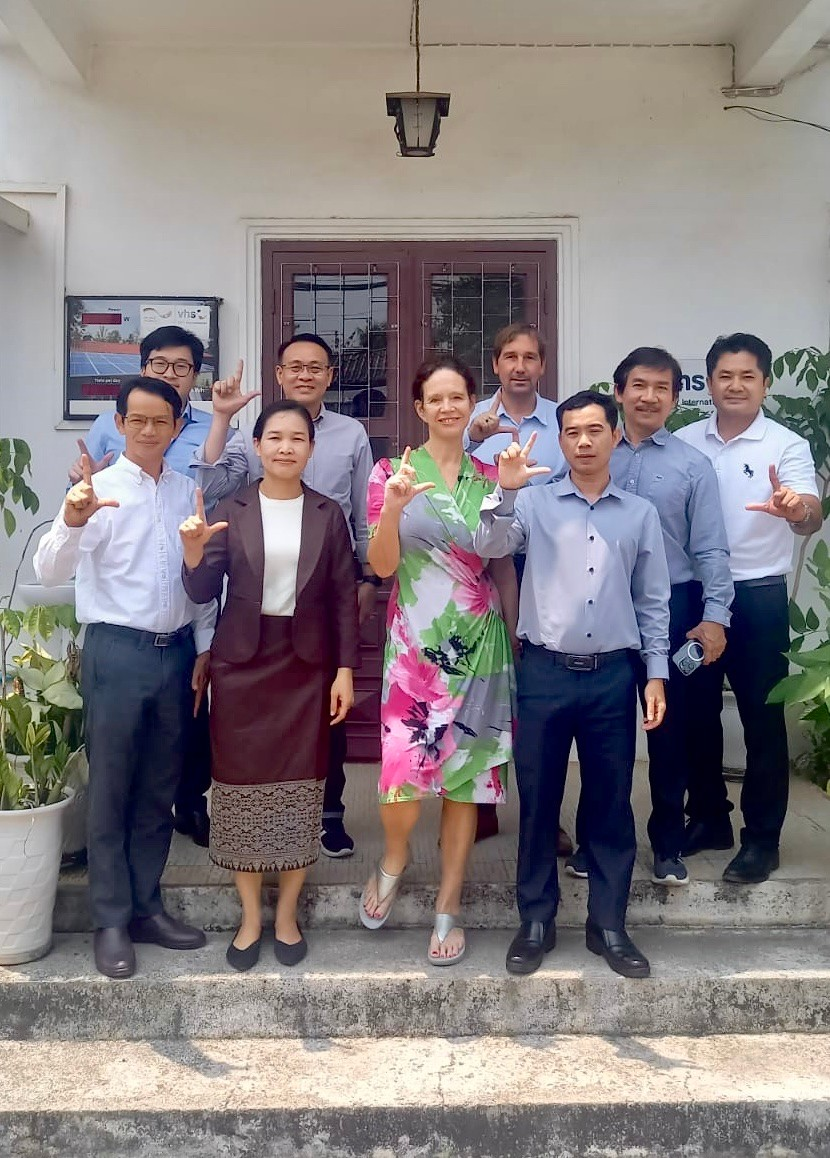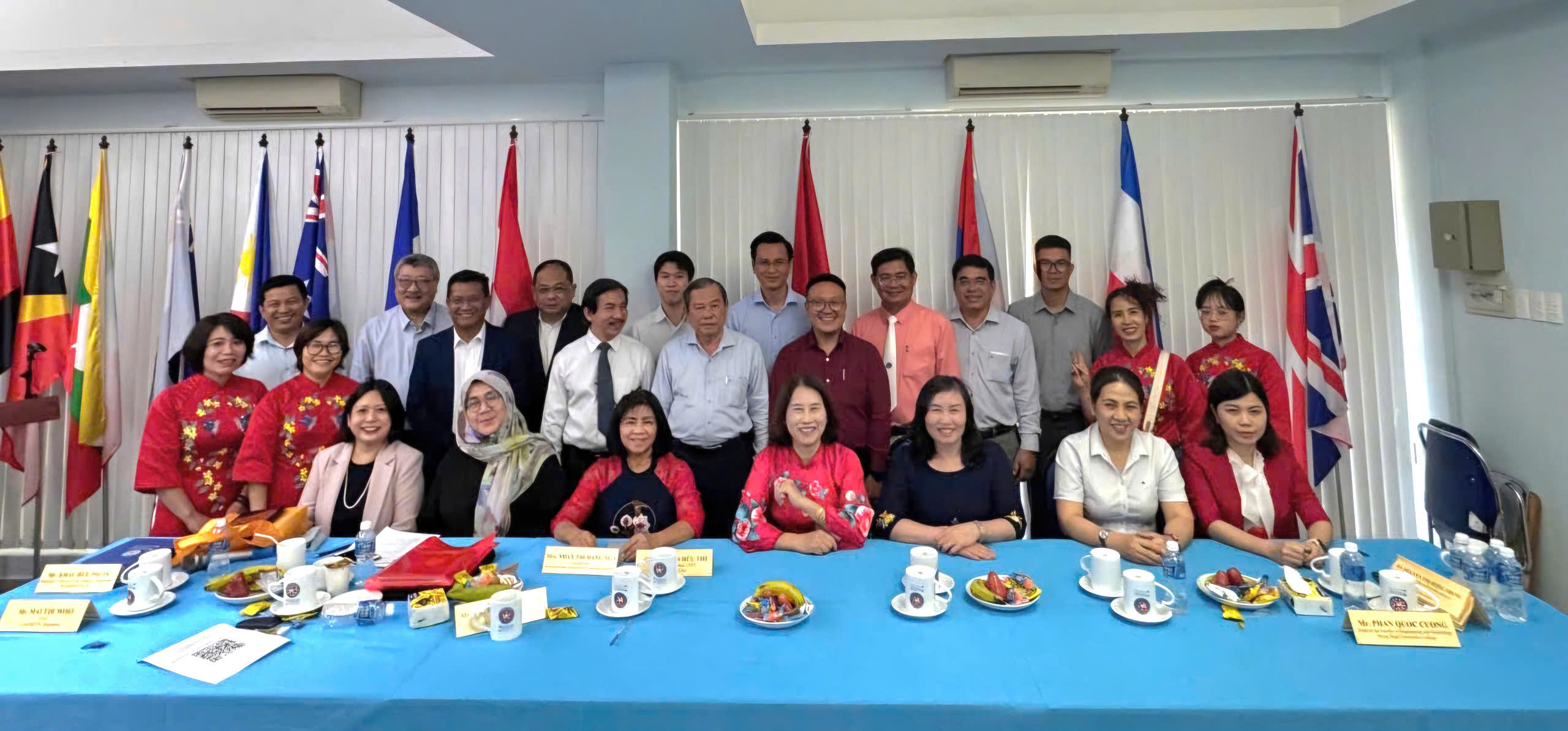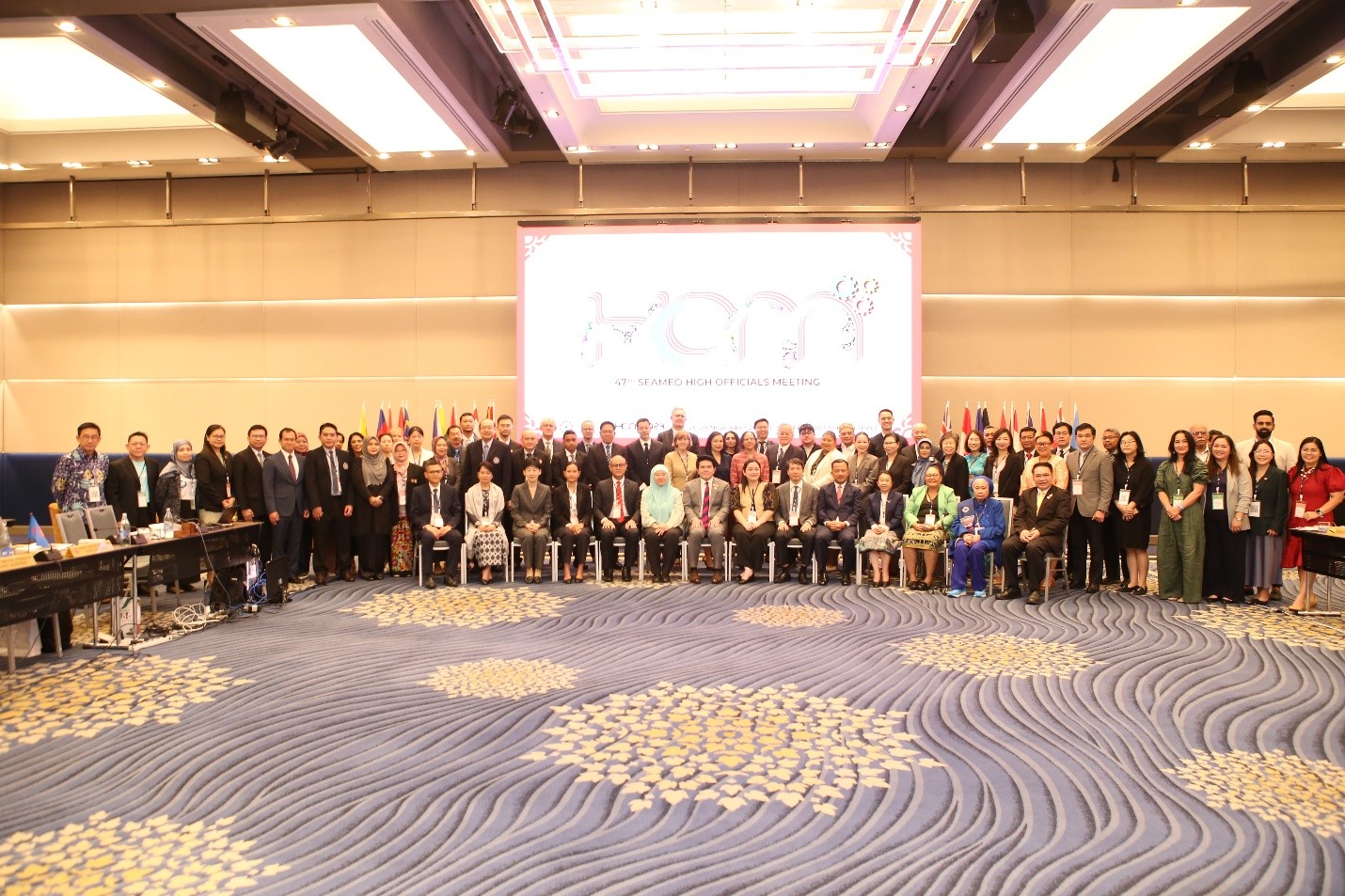On 21-22 November 2024, DVV International, the international cooperation agency of the German Association of Adult Education Centres, organised the International Conference on Lifelong Learning: Policies and Best Practices at the Settha Palace Hotel, Vientiane, Lao PDR.
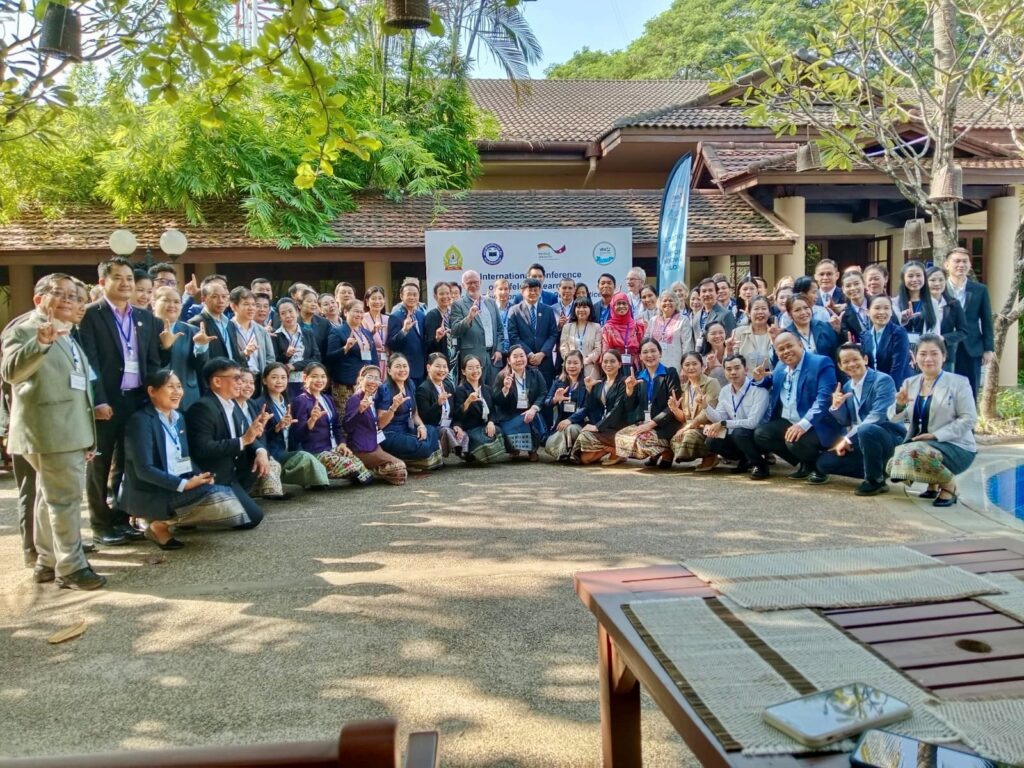
The conference brought together 80 Lao and international participants, including government officials, education experts, and educators from Lao PDR, UNESCO Institute of Lifelong Learning, UNESCO’s Regional Office, Bangkok, SEAMEO Centre for Lifelong Learning in Vietnam (SEAMEO CELLL), Royal University of Phnom Penh, Cambodia, Chulalongkorn University, Bangkok, Thailand and the Asia South Pacific Association for Basic and Adult Education (ASPBAE). This event represented a continuation of DVV International’s previous cross-country study on adult learning and education in 2019, expanding its scope to explore lifelong learning across the region. Mr Khau Huu Phuoc and Mr Phan Anh Minh, SEAMEO CELLL, are conducting the study of Vietnam.
The opening ceremony featured addresses by Assoc. Prof. Dr. Phout Simmalavong, Lao Minister of Education and Sports, and Mr. Christoph Jost, Regional Director of DVV International. Dr. Phout highlighted Laos’ commitment to lifelong learning, underscoring the recent government Decree on Lifelong Learning designed to enhance education access and skills development for both youth and adults.
In his keynote speech, Mr Uwe Gartenschlaeger, former Director of DVV International Office in Lao PDR raised the concern about the multiple challenges the world is facing. He then reviewed the key messages from the Marrakech Framework for Action (MFA), an outcome of the 7th International Conference on Adult Learning and Education, and emphasised the relevance of the MFA as a roadmap to addressing these issues.
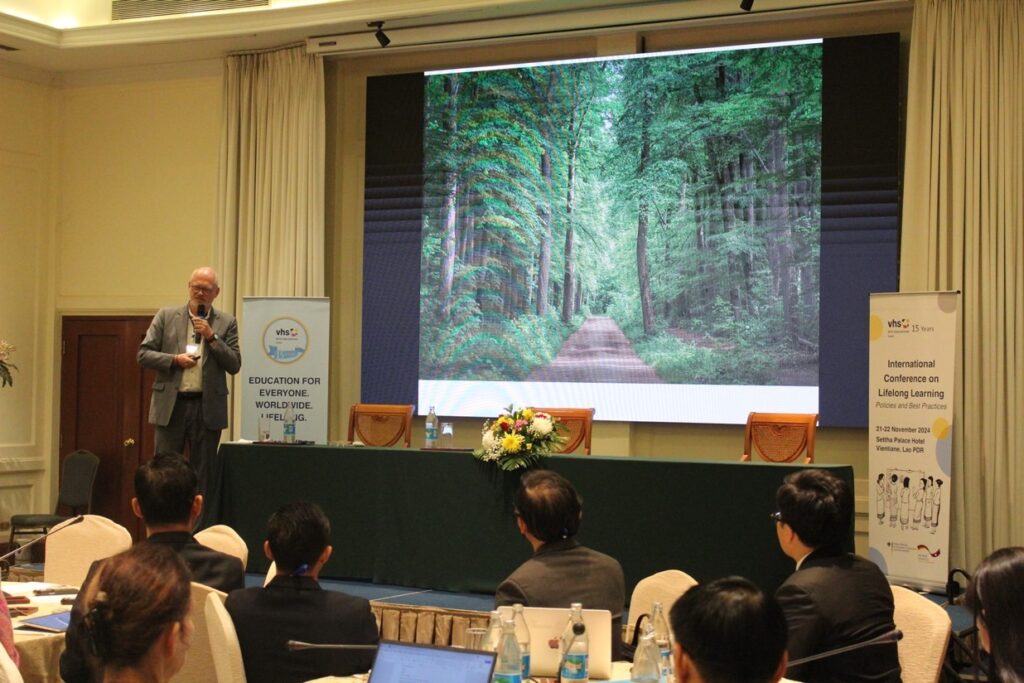
Mr Christoph Jost introduced the DVV International’s cross-study project with the engagement of Cambodia, Lao PDR, Thailand and Vietnam. He shared that lifelong learning had gained momentum in many countries around the globe, and policies, strategies, laws, decrees and other frameworks had been adopted in the meantime. He added that stakeholder groups and platforms at national, regional and international levels had been set-up. He posed critical questions about transitioning from policy to effective implementation through institutionalisation, capacity building, and community-based learning practices.
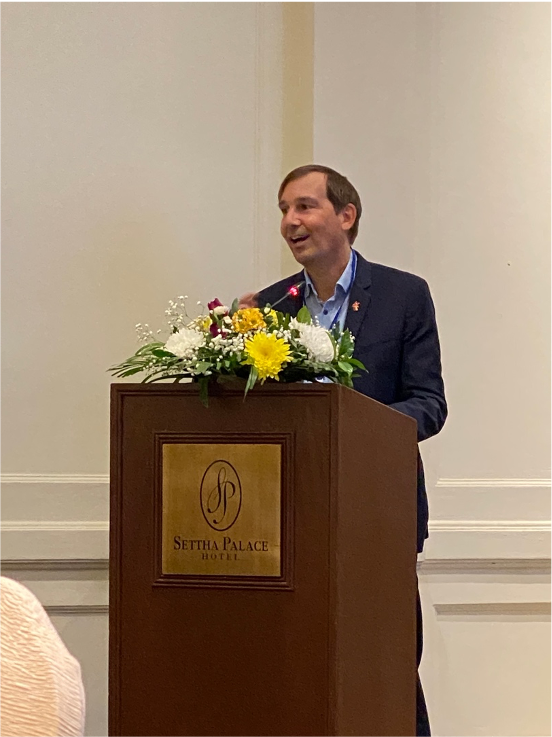
Country Presentations on Policies and Best Practices
Ms Philany Phissamay, Acting Director, Department of Non-formal Education, Ministry of Education and Sports, Lao PDR emphasised the significance of the government’s Decree on Lifelong Learning, which aims to broaden access to education beyond traditional formal schooling, providing opportunities for both young people and adults to acquire new skills and knowledge, leading to enhancement of human capital.
Mr Souksakhone Sengsouliya continued the case of Lao PDR by presenting on the different pathways (formal education and non-formal education) to the job market and higher education. He elaborated on three best practices of lifelong learning in the country: Integrating lifelong learning into the curriculum of formal education; Capacity-building on lifelong learning; Recognising lifelong learning as a national agenda.
Representing Cambodia, Dr. Dy Sam Sideth, Secretary-General of the National Committee for Lifelong Learning and Deputy Director General for Education, Cambodia, outlined his country’s progress, noting that every citizen of Cambodia has the constitutional right to free 9 years of education in public schools. In realisation of this right, and for the achievement of SDG4, the country had formed the National Committee for Lifelong Learning.
Dr Sok Soth, Faculty of Education, Royal University of Phnom Penh, elaborated on several best practices in Cambodia, including the Basic Education Equivalency Programme, the 1.5 Million Youth, which provides free vocational and technical training to some 1.5 million young people from poor and vulnerable households across the country, and the Factory Literacy Programme to equip workers in the garment industry, especially women, with basic functional literacy and skills development to improve the overall competitiveness and sustainability of the industry.
Dr. Suwithida Charungkaittikul, Department of Lifelong Education, Faculty of Education, Chulalongkorn University, Thailand, referred to the long history of lifelong education and lifelong learning enhancement in Thailand, formalised in 1939. She emphasised that the 1997 Constitution laid the groundwork for integrating lifelong learning into the national education framework, ensuring that education is accessible and beneficial to all citizens throughout their lives. Most recently, in 2023 Thailand promulgated the Learning Encouragement Act, which specifies three forms of learning encouragement: lifelong learning, learning for self-development, and learning for qualifications according to level.
Assoc. Prof. Dr. Wirathep Pathumcharoenwattana, representing the project research team, presented on various good practices of lifelong learning, among which is the Equitable Education Fund that prioritises local needs and resources and allows flexible learning options, including mobile learning.
The programme continued with Mr Khau Huu Phuoc, Research and Training Manager, SEAMEO Centre for Lifelong Learning, presenting on the policy development in Vietnam. He charted the hierarchical structure of governance, clearing defining the Constitution as the highest legislative document, but added that the Communist Party provides the top overarching guidelines. He demonstrated the hierarchy with how the Party’s Resolution 29 on fundamental and comprehensive reform of education cascades down to all policies at local levels.
In the presentation on best practices, Mr Phuoc detailed on the triangle model of community learning centre management. In this model, the CLC director is also the Head of the local government so he can align the CLC programmes to directions of the central government; the first deputy director is a leader of the local branch of the Vietnam Association for Learning Promotion, which is strong in fund-raising; the second deputy director is a school principal, who is in charge of academic programmes of the CLC. He also showcased a good practice of CLC engaging existing different groups of interest in the community so that they can share their experience with a wider circle of people.
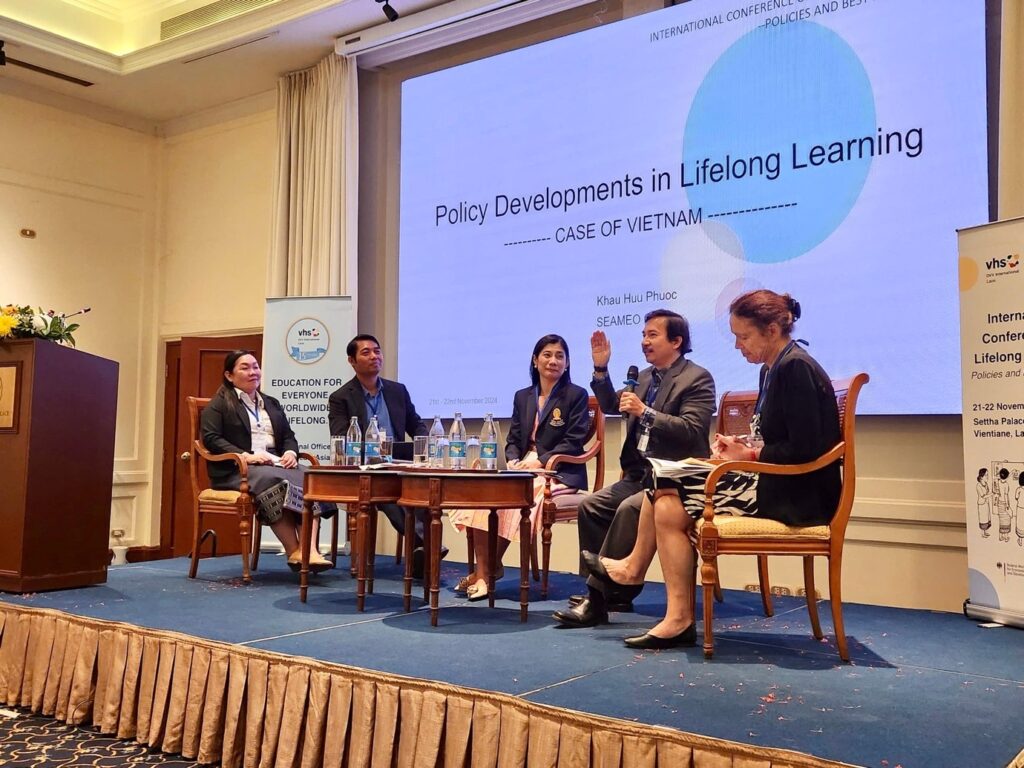
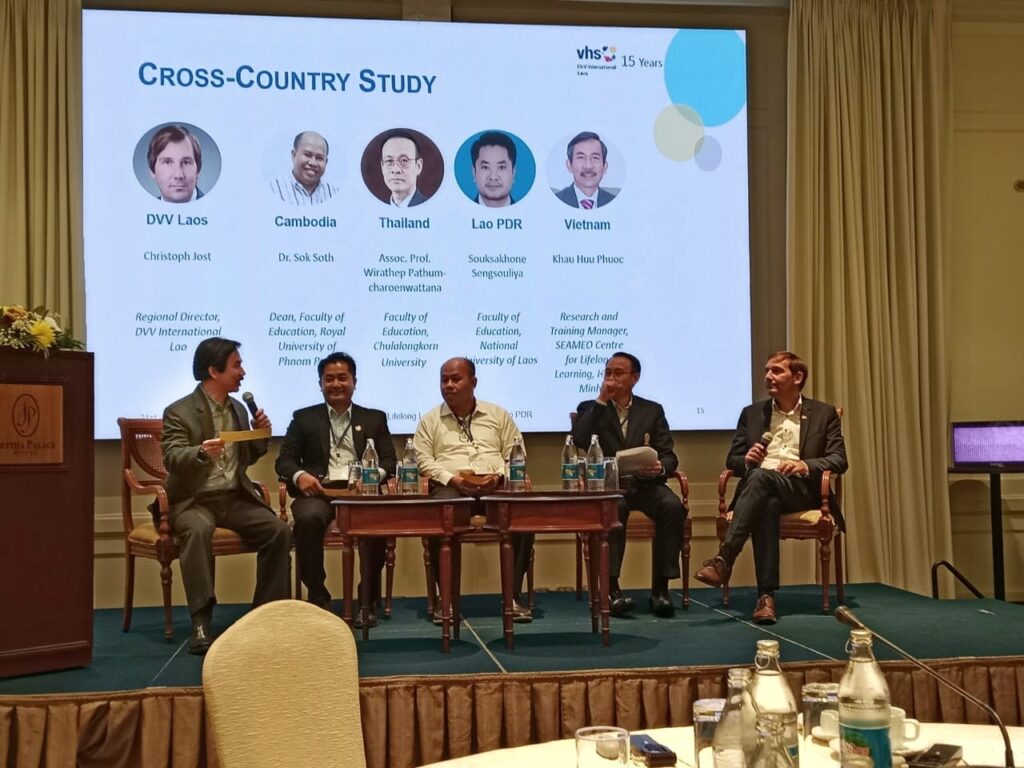
Contributions from International Partners
The conference benefited greatly from ASPBAE, the Asia-Pacific Basic and Adult Education Association, with the report of its Train-the-Trainers programme in Lao PDR, presented by Ms Anita Borkar, Consultant, Capacity Building and Institutional Strengthening, ASPBAE; the Call to Action for Transformative Lifelong Learning and Adult Education to Support a Modern Learning Society by Helen Dabu, Secretary General, Asia South Pacific Association for Basic and Education, ASPBAE; the report of UNESCO Bangkok’s Learn Big initiative by Mr Papol Dhutikraikriang; the report on DVV International’s work for lifelong learning promotion in Cambodia by Vanna Peou, Country Director DVV International – Promotion of Lifelong Learning Centres in Cambodia; the Global Perspective on Professionalization of Adult and Non-formal Education in Lifelong Learning by Prof.(H) Dr. Dr. h. c. mult. Heribert Hinzen Former Headquarters Director and Regional Director of DVV International.
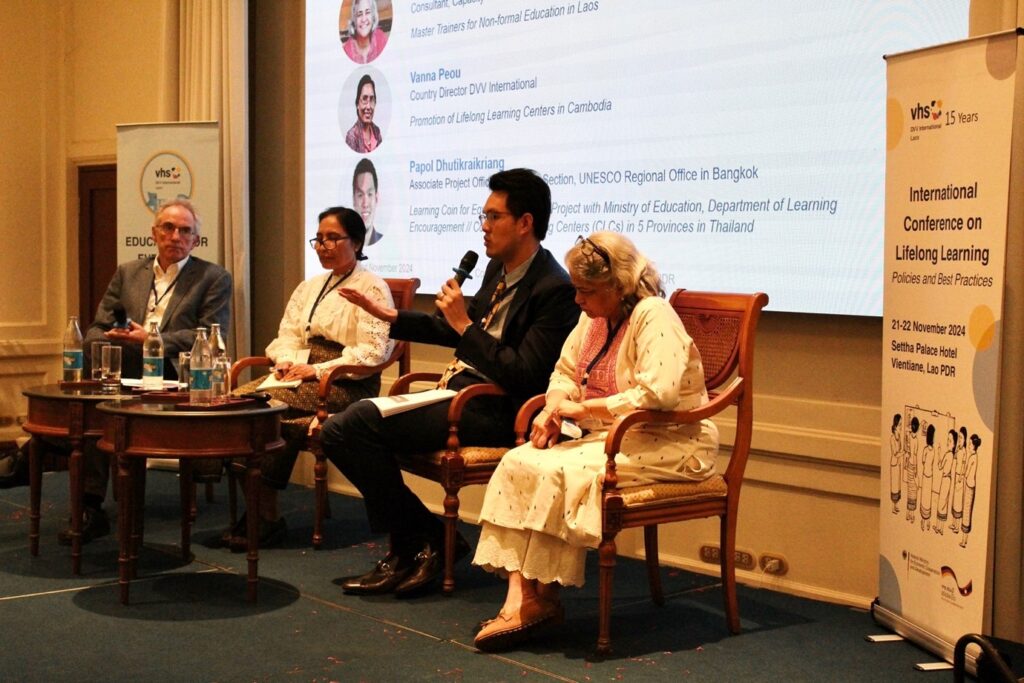
A Milestone Celebration
This conference was more than just an academic gathering. It also celebrated its 15th anniversary of the office in Lao PDR, a milestone on DVV International’s journey of adult learning and education promotion in Southeast Asia, made successful by its directors, Prof Heribert Hinzen, Mr Uwe Gartenschlaeger, Dr Johann Heilmann, and currently Mr Christoph Jost.
